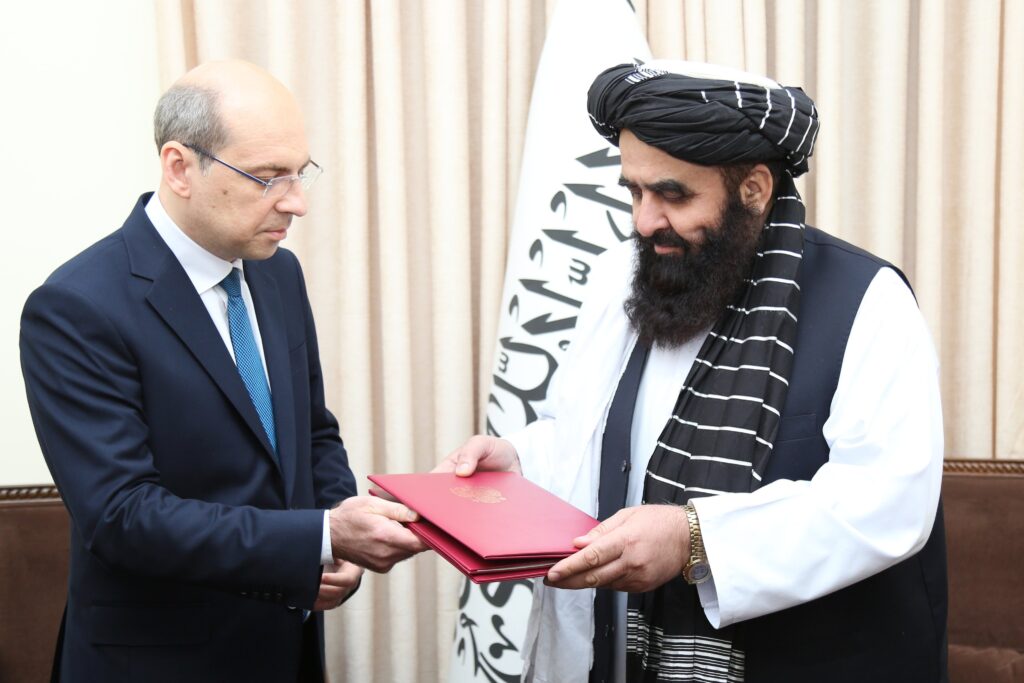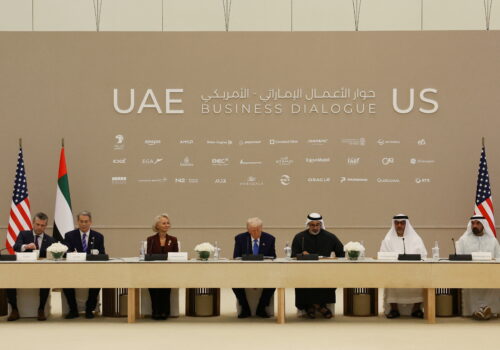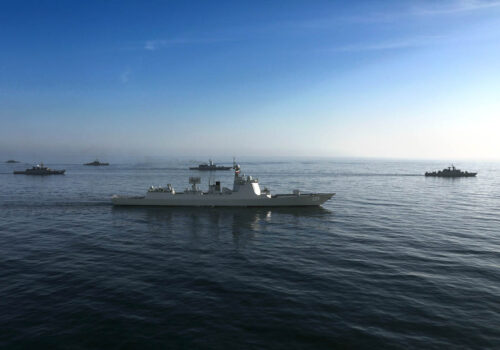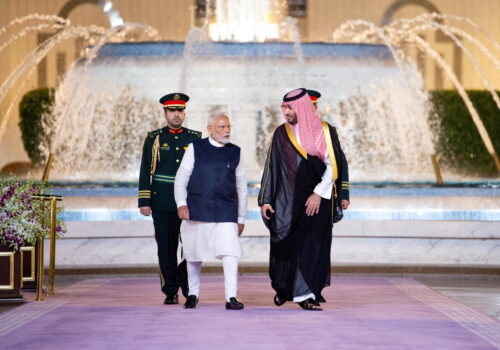Since the Taliban reconquered Afghanistan nearly four years ago, some Gulf Cooperation Council (GCC) members and a host of other non-Western governments have, in various ways, engaged the de facto authorities in Kabul. In doing so, these countries have been pragmatic in accepting that the Taliban is probably not on the verge of falling. High-profile meetings between Gulf and Taliban officials highlight the Islamic Emirate’s gradual integration into Eurasia’s diplomatic fold and the security architecture of Greater Central Asia.
Russia on July 3 became the first country to formally recognize Afghanistan’s Taliban government since its return to power in August 2021. As a permanent United Nations (UN) Security Council member, Moscow’s decision will likely further ease the Taliban’s international isolation and encourage Russia-aligned states—especially in Central Asia—to follow suit.
In this geopolitical landscape, the stances of GCC members take on new significance. While maintaining close ties with the West, these monarchies have increasingly embraced multi-aligned foreign policies, strengthening ties with Russia and China. How they approach the question of Taliban recognition will speak to their evolving priorities and constraints in a more multipolar world.
At this juncture, while the GCC states are unlikely to grant formal recognition to the “Taliban 2.0” in the immediate future, Russia’s recent move has somewhat shifted the diplomatic landscape, making such a development increasingly plausible. The United Arab Emirates (UAE) stands out as the key GCC actor to watch.
Abu Dhabi’s calculated engagement with the Taliban
Albeit short of formally recognizing the “Taliban 2.0,” the UAE has maintained extensive engagement with the Islamic Emirate since its August 2021 return to power, reflecting Abu Dhabi’s pragmatic approach to post-US Afghanistan. In May 2022, GAAC Holding (an Abu Dhabi-based state-affiliated airline services firm) secured a contract to manage operations at Afghanistan’s three major airports: Kabul, Kandahar, and Herat. Additionally, FlyDubai (a Dubai-headquartered government-owned carrier) has continued regular flights to Kabul, underscoring the UAE’s pivotal role in maintaining Afghanistan’s connectivity to the Gulf and, by extension, the rest of the world.
The Emiratis have also provided significant humanitarian support, establishing an air bridge to deliver food and medical supplies just one month after the Taliban reconquered Afghanistan, thereby addressing some of the country’s most acute challenges with the Islamist regime back in power.
On the diplomatic front, the UAE has made significant moves which undercore its deliberate decision not to treat the Islamic Emirate as a pariah regime, even if it has not yet formally recognized the “Taliban 2.0”. For example, UAE President Mohammed bin Zayed hosted Taliban Interior Minister Sirajuddin Haqqani and Defense Minister Mullah Yaqoob in Abu Dhabi in December 2022 and June 2024, respectively. By August 2024, the UAE followed China to become the second country to accept the credentials of a Taliban ambassador. Apart from Russia, China, and the UAE, currently the only other countries to have done so are Kazakhstan and Uzbekistan.
SIGN UP FOR THIS WEEK IN THE MIDEAST NEWSLETTER
From 1998 to 2001, only the UAE, Saudi Arabia, and Pakistan formally recognized the “Taliban 1.0” as the legitimate authority in Afghanistan. At the time, Emirati foreign policy operated largely within the Saudi orbit of influence, reflecting a somewhat deferential posture. Its recognition of the Taliban was thus essentially a function of alignment with Riyadh. Today, however, with Abu Dhabi conducting a far more autonomous and assertive foreign policy, the UAE’s own national interests would primarily drive any future move regarding Taliban recognition. Such a decision by Abu Dhabi would be driven not by ideology, but rather by pragmatic considerations—chiefly the UAE’s geo-economic interests, as well as security concerns related to the Islamic State Khorasan Province (ISKP).
Understanding the UAE’s current foreign policy toward Afghanistan necessitates a careful examination of Abu Dhabi’s long-standing relationship with the Haqqani network—a powerful faction within the Taliban founded by Jalaluddin Haqqani, known for its insurgency against the US military. Since the Taliban’s return to power in 2021, the UAE has sought to recultivate its ties with this network, affording Abu Dhabi a distinct set of strategic levers for asserting influence in post-occupation Afghanistan. While the Haqqani network maintains its closest external connections with Pakistan and the UAE, other elements of the Taliban have increasingly oriented themselves toward Russia and Iran. Moscow’s recognition of the Islamic Emirate raises questions about whether the Haqqani faction will realign toward Russia. If it does, the likelihood of Abu Dhabi following suit with formal recognition of the Kabul regime would rise. Conversely, if the network maintains its distance, the UAE may opt for a more cautious approach and not officially recognize the Islamic Emirate any time soon.
The strong Abu Dhabi-Moscow relationship should be taken into account when assessing the Emirati calculus regarding Taliban recognition, in light of Russia’s decision to recognize the Islamic Emirate. The UAE has distinguished itself as the GCC member most willing and able to align with Moscow on many issues. Notable examples include Abu Dhabi’s support for strongmen in Libya and Sudan, earlier initiatives aimed at rehabilitating Syria’s former regime, refusal to join the West’s pressure campaign against Moscow following Russia’s 2022 invasion of Ukraine, and the UAE’s ascension to BRICS+—all undertaken in opposition to Washington’s interests.
Saudi reluctance toward recognition
Although Saudi Arabia recognized the original Taliban from 1998 to 2001, it is unlikely to extend recognition to the “Taliban 2.0” absent broader international consensus. Riyadh’s caution reflects its desire to preserve its détente with Iran. Saudi officials understand that Tehran could perceive GCC states as “surrounding” Iran by forming closer relations with post-occupation Afghanistan as a threat. Riyadh also has concerns about reputational risks tied to engaging the Taliban too closely. As such, Saudi Arabia prefers to engage Afghanistan through multilateral bodies like the Organization of Islamic Cooperation, focusing on humanitarian assistance and the ISKP threat while keeping its distance from the Taliban.
Crown Prince Mohammed bin Salman (MbS) may also be reluctant to recognize the Taliban government, fearing it would stir opposition to his reform efforts among elements within Saudi society. With MbS at the helm, Saudi Arabia is undertaking a wide-ranging transformation aimed at reshaping its economic foundations and recalibrating its societal trajectory. Central to this vision is a move toward greater economic diversification and “moderate Islam,” departing from some of the Kingdom’s ultra-conservative Wahhabi traditions. Although these reforms reflect a forward-looking agenda, they unfold within a complex socio-political environment where shifts of this magnitude can generate resistance. One source of potential tension stems from the evolving regional landscape, particularly the Taliban’s return to power, which may embolden ideological currents that challenge the Kingdom’s reformist course.
A revival of grassroots sympathy for Sunni Islamist extremism could pose serious risks to Saudi Arabia’s domestic stability and ambitious Vision 2030 plans.
Qatar’s “bridging without embracing“
Although Qatar never formally recognized the Islamic Emirate in the 1990s, Doha maintained “cordial” ties with the “Taliban 1.0”. From former US President Barack Obama’s time in office until the August 2021 withdrawal of US boots on the ground under former President Joe Biden, Qatar served as a key diplomatic bridge between Washington and the Taliban—a role it continues to play in post-occupation Afghanistan. However, Doha’s ability to influence Taliban behavior has been limited. Though Qatar may eventually consider formal recognition of the “Taliban 2.0,” it is unlikely to lead among GCC states in doing so.
A key constraint is Doha’s sensitivity to its image in Washington, where it has long faced accusations of supporting extremist actors. Formal recognition could invite renewed scrutiny from US policymakers and media figures, potentially exposing Qatar to controversy in the United States, its most critical security partner, and undermining the goodwill it has worked hard to build, especially with President Donald Trump’s current administration.
The grander geopolitical picture
Throughout the Ukraine war, Russia has increasingly turned to the Gulf, leveraging its ties with states in the sub-region to counter Western efforts aimed at isolating Moscow. The GCC members’ careful balancing act between the West and Russia reflects their desire to maintain strategic flexibility in an increasingly multipolar world. Notably, instances where Gulf states, particularly the UAE, have aligned more closely with Moscow than with Western powers underscore the existence of meaningful geopolitical and ideational synergies. This dynamic could, at least at some point, lead these monarchies to view the question of Taliban recognition in a somewhat more favorable light.
Russia’s ability to assert influence in Taliban-ruled Afghanistan less than four years after Washington’s botched withdrawal is likely to feature prominently in Kremlin talking points. This is particularly relevant to Moscow’s outreach to the Arab-Islamic world and the Global South, where Russia seeks to position itself as a credible alternative to Western leadership. Within this context, Afghanistan’s significance could elevate within the broader Russia-West rivalry.
While the precise trajectory of great power competition in Afghanistan remains uncertain, current trends suggest that the country is likely to drift further into Russia, China, and Iran’s spheres of influence. This evolving alignment requires Gulf Arab monarchies to make sensitive decisions concerning the recognition question, especially if they are under pressure from Washington to refrain from further legitimizing the Islamic Emirate, while Moscow and Kabul intensify efforts to persuade GCC members to take that step.
Given the Gulf states’ considerable geopolitical weight, strategic geography, substantial economic resources, and expansive soft-power reach, their formal recognition of the Taliban would mark a pivotal moment in its quest for international legitimacy. However, when—and under what conditions—GCC members will conclude that such a move aligns with their national interests remains an open question.
Giorgio Cafiero is the CEO of Gulf State Analytics, a Washington, DC-based geopolitical risk consultancy. He is also an Adjunct Assistant Professor at Georgetown University.
Further reading
Wed, Jul 9, 2025
For the Gulf, business comes first—even after the Twelve Day War
MENASource By Joze Pelayo
Gulf leaders' desire to shift the regional narrative toward economic and technological development continues to be hijacked by conflict.
Fri, Jun 13, 2025
China’s basing quest in the Gulf: Pipe dream or strategic reality?
MENASource By
While the Gulf remains central to China’s long-term maritime aspirations, its near-term military footprint is likely to stay limited.
Tue, Jun 3, 2025
India-Gulf relations are muted—but mobilizing
MENASource By Jonathan Fulton
The depth of Indian-Gulf relations creates a strong foundation for increased India-Middle East integration over the coming decades.
Image: Moscow, Russia ? Afghan Foreign Minister Maulvi Amir Khan Muttaqi (right) met with Russian Ambassador Dmitry Zhirnov (left), where the Russian government's decision to recognize the Taliban government in Afghanistan was officially announced in Moscow, Russia, on July 3, 2025. Russia thus became the first country to formally recognize the Taliban government in Afghanistan since taking power in 2021, after Moscow removed the group from its list of banned organizations.




